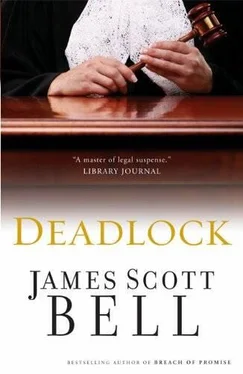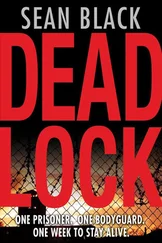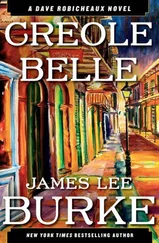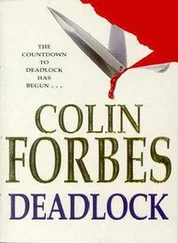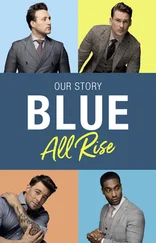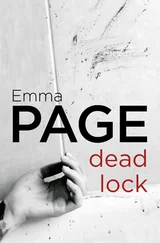
James Scott Bell
Deadlock
Copyright © 2002 by James Scott Bell
This book is for
Tracie Peterson
The girl heard herself scream.
Oh, God, don’t let them do it!
Her words were only in her mind. Her mouth was open, but only sputtering gasps came out, issuing an awful ak ak ak sound.
Her eyes felt puffy, raw. Where was she?
A bed. She was in a bed. Hers.
She put a hand on her stomach.
Don’t let them!
Hand on stomach and head spinning. Warm sweat on her face. She had been sleeping.
And she knew she’d had the nightmare again, the same one, the one where they were dressed in black. Not white smocks. Black robes. They had her tied down on the cold, hard ground. Her wrists, in the dream, were fastened to stakes. She could not move. One of the robed ones laughed at her.
It always seemed like an image from a horror film, one of those devil movies where the devil actually comes to life.
Life. That was what she’d had inside her. A life, a baby. She knew that now. They hadn’t told her. In the dream she had seen him, a son, a little boy. Her stomach was like a window, and she could see into it. A dome of glass, and under the dome her baby.
He had opened his eyes and looked at her.
Don’t let them!
But in the dream the robed ones closed in, and one of them had a knife. He was going to do it – she had said he could, but now she didn’t want him to, and she tried to move, but she was tied down.
That was always when she heard herself scream.
This was the fourth night in a row she’d had the dream. It had come and gone before, but now it came every night, and she knew it would never go away. She had tried to end the dreams before, with a razor blade. But Mama had found her and the doctors brought her back to life.
She did not deserve life. That was another thing she knew. That’s what the dreams were telling her. At sixteen she had lived too long, long enough to let them kill her baby.
Barefoot, in underwear and a T-shirt, she slipped out of bed so her mama wouldn’t hear, and then out the window into the warm southern night. The smell of old tires and rusted car parts hit her, and the buzz of cicadas was as loud as her beating heart. She headed for the highway, for pavement, so she could run flat out. She knew she’d have to make a decision soon. What could she do? Wait for a truck and throw herself in front of it?
Or maybe the bridge.
Yes, that was it. Just like in that song her mama used to sing to her, about that girl named Billie Jo who jumped off a bridge. There was one just a mile away, over the gorge. She’d thrown rocks off it once with Cody. He’d said he loved her then but it was a lie. He said get rid of the baby and he wouldn’t tell. Then he told her to leave him alone forever.
Now she’d go over the gorge like a rock herself, and Cody would know about it. They’d all know about it. They’d all suffer like she had suffered.
For one second she thought about not doing it, because of Mama, even though Mama yelled a lot. She would be alone. But in that second the hurt inside took over and she remembered the dreams and knew this was the only way.
Once she looked back and thought she saw something, a scary something. The people in black robes. Only this time there were hundreds of them and they were running behind her, almost pushing her. She thought she heard them whispering in unison, do it, do it, do it.
She would do it. She reached the bridge and saw it outlined against the moon. She could hear the rush of the river below, deep in the gorge, sloshing over sharp rocks. When she started over the bridge, the waters sounded like they were singing.
Singing…
No, it was voices singing. Real voices. Somewhere close. There was a campground on the other side of the bridge. That meant people.
She stopped for a moment. What were they singing? Something about… Jesus. A church camp maybe? A bunch of kids singing church songs. She’d done that once, a long time ago, before Mama stopped going to church. She had once sung songs about Jesus. No more. Jesus hated her.
She thought of God then, and wondered why God hadn’t stopped them from doing it, hadn’t stopped her from letting them. If God was real he would reach down right now and make it all better, bring her baby back.
God should have stopped it before it happened. He gave the laws, didn’t he? She thought about the law that was supposed to protect her. Wasn’t that why they’d made her sign the paper? She didn’t understand it, but they said to sign it, so she did. They said it was the law, and the law was good and it would protect her.
It didn’t.
And if the law didn’t protect her, and God didn’t, nothing else would either. She moved to the middle of the bridge.
There was a narrow strip of asphalt road across the bridge with small steel rails on either side. She’d be able to hop it, no trouble.
The singing got louder. They were praising Jesus. He hadn’t reached down to help her either, any more than God had.
She hesitated. One second between life and death. It wouldn’t be so bad. And then she wouldn’t have the dreams anymore, and everybody’d be sorry, and they’d know they killed her and her baby, and they’d cry. All of them.
She thought she heard something. Someone coming. A voice said, “Hey…”
She jumped up on the rail.

*
We are very quiet on the Supreme Court,
but it is the quiet of a storm center.
JUSTICE OLIVER WENDELL HOLMES
Millicent Mannings Hollander could not stop looking at evil.
She sat, along with her eight colleagues, on the raised dais facing the marble frieze over the main entrance to the United States Supreme Court. The frieze depicted the forces of evil – deceit and corruption – overcome by good: security, charity, and peace. The scene was dominated by the triumphant figure of justice, an enduring testament to the greatest virtue of the law.
As a ten-year veteran of the Court, Millie Hollander had seen that artwork hundreds of times. Why should it jump out at her now? Was it simple judicial fatigue? Though in relatively good shape at fifty-two (she liked to shoot hoops in the Supreme Court gym), every term was a challenge.
Work on the Court was a day in, day out cavalcade of cases, court petitions, emergency appeals, oral arguments, conferences, analyses, and draft opinions. The same held true even for the three hundred other employees of the Court – everyone from the private police to the cafeteria cooks – who did not don the robes.
Though she loved everything about the Court, by mid-June Millie was ready for the recess, the summer break that lasted until Labor Day.
But mere weariness wasn’t behind this perception – this sensation – of evil. She’d been tired before. No, there was a feeling of something deeper, something out there.
She blinked a couple of times and then thought it might just be the lawyer at the podium. Not that lawyers were evil (though some might be inclined to disagree with her there) but he was phrasing his argument in apocalyptic terms. “The matter is not simply what is right for this student,” he had just said, “but for all the future students who must decide if life has any meaning at all.”
Читать дальше
